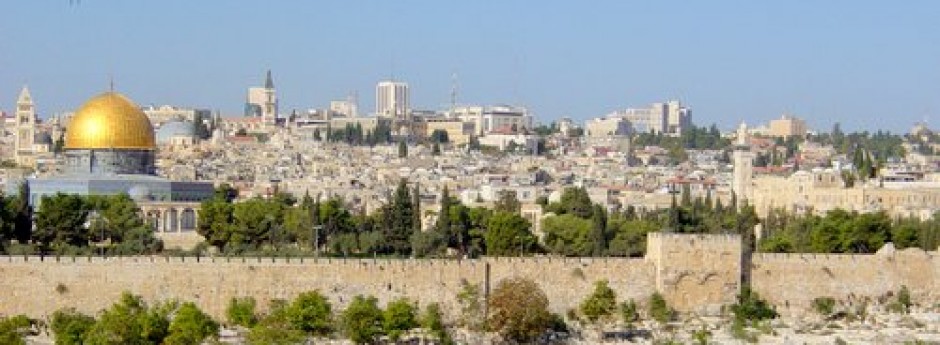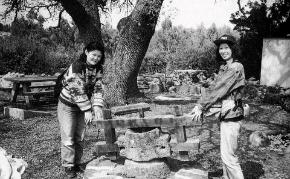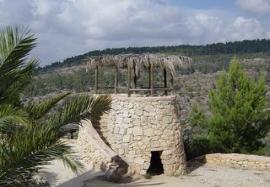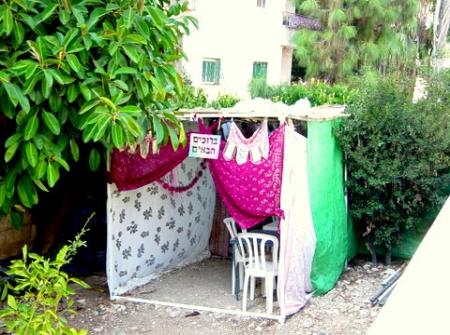-14-
Lessons For Gentile Christians And Churches
The Word of God is alive (Heb. 4:12). It cannot pass away. God’s promises cannot fail. Whether it be ten years, a hundred years, or a thousand years, it makes no difference. God’s Word will still stand, and his promises will certainly come to pass. As Isaiah 40:8 states: “The grass withers and the flowers fall, but the word of our God stands forever.”
Today there are many Christians who apparently feel that God’s word in the Hebrew Scriptures (Old Testament) is no longer applicable to their lives, or even valid. We can assume this because so little attention is paid to the Old Testament by many. Some today even consider themselves “New Testament Christians.”
These Christians do not stop to realize that the Hebrew Bible is the foundation of our faith. It was the only scripture the earliest Church had, and they clung to its every word. It was the Hebrew Bible that Paul spoke of when he said to Timothy: “All Scripture is God-breathed and is useful for teaching, rebuking, correcting and training in righteousness…” (2 Tim. 3:16). It was the same Hebrew Bible that Jesus spoke of in saying that “…the Scripture cannot be broken…” (Jn. 10:35).
A NEW LOOK AT THE OLD TESTAMENT
The rise of Israel is forcing us to take a new look at the Old Testament or the Hebrew Bible. Why is this? Simply because in Israel today the Hebrew Bible is being fulfilled. The very presence of Israel in the Holy Land is a fulfillment of numerous scriptures like Isaiah 43:5-6 and Jeremiah 31:10-14. Like a seed that has lain dormant for centuries and suddenly sprouts, the Old Testament is coming alive today.
Now we are being forced to look at the part of the Bible that we previously overlooked. Why did we overlook it? Many times we overlooked it because we simply didn’t understand it. Now that Israel has returned to the land, many things are becoming clearer to our understanding.
Since Israel is back in the land, it is possible for the first time in almost two thousand years to celebrate biblical festivals in their proper seasons. The sabbatical year, or Shmitah, is observed once more by many devout Jews in the land. It sheds light on the Jubilee, which we see in the Old Testament, and even has significance for the New Testament. There are numerous other things that have come to light since Israel has returned to the land. The discovery of the Dead Sea Scrolls is one example of this. These scrolls now shed great light not only on the Old Testament but the New Testament as well. The scrolls were discovered about the time that the nation of Israel was reborn. In fact, on the exact day the UN was voting on the Partition Plan, paving the way for a nation of Israel to be created, the first of these newly discovered scrolls was acquired. Israeli Professor Sukenik acquired them after a perilous trip to Bethlehem. They had been hidden for the whole time Israel was dispersed among the nations, and only revealed as she was becoming a nation
once again.
As Sukenik deciphered the first of these scrolls on November 29, 1947, he was getting simultaneous reports on the voting at the UN. This voting was to determine whether or not Israel could once more become a nation. It is interesting that the scroll he was working on at the time came to be known as the Thanksgiving Hymns. The passage on which he was working as the voting was taking place had been written long before Israel’s dispersion, yet it had an incredibly prophetic bearing upon the events happening. The passage reads, “I was driven from my home like a bird from its nest…I was cast down, but raised
up again.” 1
Had it not been for the keen interest and understanding of devoted Israeli academics at this point, the scrolls could have possibly been lost or destroyed.
It is now an indisputable fact that the Dead Sea Scrolls have revolutionized our understanding of the Bible. The scrolls now provide us with manuscripts many centuries older than those that were relied upon before their revelation. The scrolls provide us with a complete book of Isaiah, now on display at the Shrine of the Book in Jerusalem. They provide us with portions and fragments of all the other Old Testament books, with the exception of Esther. Numerous other commentaries and works were also found that shed new light on the Old Testament.
NEW LIGHT ON THE NEW TESTAMENT
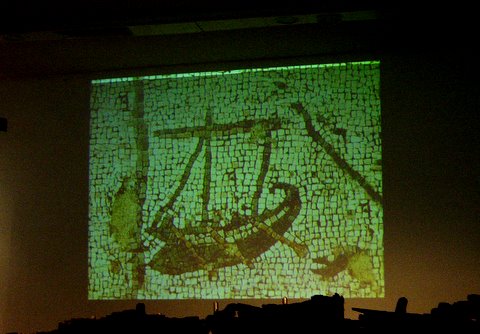
From this mosaic discovered at Migdal we can now understand
what boats in Jesus’ day looked like
Other archaeological discoveries in Israel have greatly helped us with our understanding of the New Testament. Consider the “Jesus boat” that was discovered almost intact on the shores of the receded Sea of Galilee in 1986. This boat literally brings the biblical story of Jesus to life, since it is dated generally in the period of 100 BC to AD 70. 2 Consider the discovery of what many scholars believe is St. Peter’s House at Capernaum on the Sea of Galilee. According to archaeologists, this house was occupied in Jesus’ time and soon became a Christian gathering place. On the site, archaeologists found crosses etched on the wall, Herodian coins, lamps and fishhooks from Jesus’ era. 3 Consider the recent discovery of the Jerusalem tomb of Caiaphas the High Priest. His name is even etched on the outside of his sarcophagus. 4 These biblical accounts have now become more alive and are not just stories.
Many of these archaeological discoveries are being made because of current Israeli building and re-settlement activity. This was the case with the discovery of Caiaphas’ tomb. Numerous times when a new road is cut or the foundation for a house is excavated, a new and exciting discovery is made that increases our biblical understanding.
There are many other discoveries shedding light on our New Testament. A few years ago in the northern section of Jerusalem the remains of a crucified man were found.
Interestingly, the rusty nail was still in place in the man’s heel.5 This find brings up the clear possibility that Jesus was not crucified as he has been often pictured, but that his legs were folded up underneath him and his heels nailed together.
A few years ago in Caesarea, an inscription was uncovered with the mention of Pontius Pilate. It was the first mention of Pilate in any archaeological record.6 The find certainly authenticates the New Testament story.
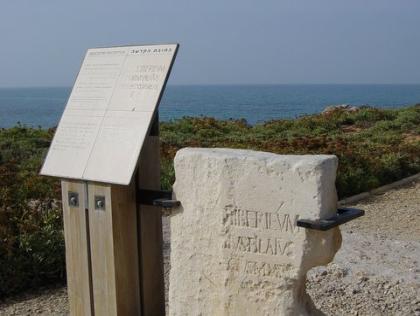
The inscription at Caesarea is the first to mention Pilate
Also in a recent inscription the word “Nazareth” was uncovered. It was the first mention of the city in Jewish epigraphy. This third or fourth century inscription may shed some light on an old controversy. From the Greek language of the New Testament it is impossible to determine whether or not Nazareth was spelled with a “z” or with a “tz.” The Hebrew inscription solves the problem in favor of the “tz.”
This revelation may clear up an even greater controversy, because it clearly links Nazareth with the Hebrew word “netzer,” meaning “branch.” 7 In Matthew 2:23 it is said, “and he went and lived in a town called Nazareth. So was fulfilled what was said through the prophets: ‘He will be called a Nazarene.’” Many Christians have been baffled by this statement for centuries, since there is no prophecy in the Bible stating this. Now through archeology we can understand how the prophecy is fulfilled, since Jesus was called “the Branch” (Jer. 33:15; Zech. 3:8).
Also, there are a great number of excellent Israeli archaeologists on the scene today to immediately interpret any new discovery. All these discoveries help with our understanding as they bring long-hidden truth to light. The Bible does assure us that “Truth shall spring out of the earth…” (Psa. 85:11 NKJV).
THE WHOLE BIBLE COMES TO LIFE
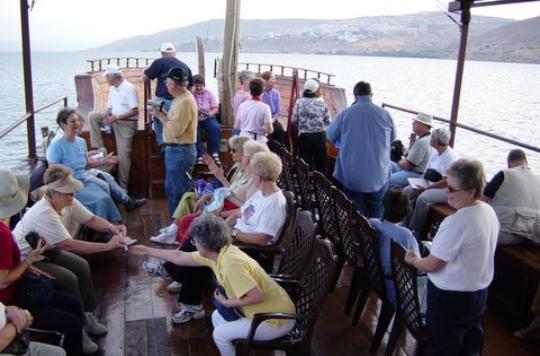
Christian pilgrims enjoy a boat ride on the Sea of Galilee
Today in modern Israel it is possible to see, hear, taste, smell and feel the Bible. It is possible to observe weather patterns as they were in the Bible. One can experience the early and latter rains (Deut. 11:14); the hot desert wind or Sharav (Job 37:17); the fierce winter storm (Sharkia) that sweeps down without warning on the Sea of Galilee
(Matt. 8:24).
One can observe the plants, animals and birds of Bible days. Lessons can be learned from the ancient trees like the palm with its straightness and fruitfulness (Psa. 92:12). At Ein Gedi the little coney or hyrax can be seen playing on its fortress of rocks (Deut. 14:7). The stork can be observed in its bi-annual migration (Jer. 8:7).
We can see with our own eyes the contrast between the wilderness and the inhabited land (Psa. 107:35). After a hard rain in the high country we can understand about streams in the low-lying desert (Psa. 126:4). We can smell the flowers of a restored and beautified Israel (Isa. 35:1). We can taste its luscious and abundant fruits (Isa. 27:6).
There are a thousand things we can learn about life in ancient times. We can see an old olive press; see an ancient flour mill and lift its mill stone (Matt. 18:6); climb up into the remnants of ancient watchtowers (Isa. 21:5-6); see an ancient stone sheep pen with its door (John 10:7). We can see shepherds leading their sheep and talking to them in much the same way our Hebrew fathers must have done and in the way Jesus would like to lead his followers (John 10:27).
|
Two Christian tourists try grinding |
|
We can drink from Jacob’s well (John 4:6), wade through Hezekiah’s water tunnel (2 Chron. 32:1-4), walk on Jerusalem’s wall (Neh. 12:31-39). We can understand about city gates by walking through them ourselves (Psa. 87:2). We can try to roll back the massive stones on ancient tombs (Mark 16:3).
In the peaceful Galilee we can see fishermen working in small boats as they must have done in biblical times. At night we can hear them beating the water in an attempt to frighten fish into their nets. All these experiences in the land help us to better understand both the Old and New Testaments.
It is for these reasons that the land of Israel is often referred to by Christians as the “fifth gospel,” the gospel that can be personally experienced.8 We understand now that there is a geography of salvation as well as a history of salvation. There is a place on earth where God has revealed himself to man.
HELP IN UNDERSTANDING BIBLE PROPHECY
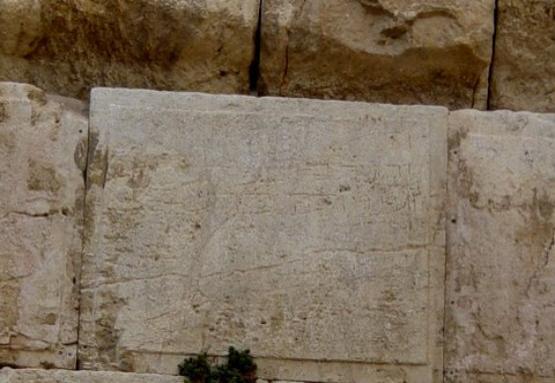
A stone in the western wall speaks of Israel’s rebirth by quoting Isaiah 66:14:
“When you see this, your heart will rejoice and you will flourish like the grass…”
Today there is a great interest in Bible prophecy. Unfortunately, much of this prophecy seems off-center, because there is lack of understanding about Israel- about its land and its people. There are many prophecy conferences today, but often these conferences do not take into account the knowledge of Israel, nor do they express any real interest in or concern for Israel. They simply use Israel as some kind of time clock to suit their own purposes and fancies.
We see in the Bible that true prophets always talk about Israel and are always concerned with the welfare of Israel. In the New Testament we see a prophet by the name of Agabus. Even Agabus was concerned with Israel and prophesied concerning a famine that would afflict the land (Acts 11:28).
Let us illustrate how this present lack of focus upon Israel may have caused us to err seriously in our prophetic interpretation. For the last century and a half, there has been a great prophetic emphasis upon the saints escaping or being rescued from this earth in the rapture. This teaching began with the Brethren movement in England and Ireland in 1830. 9 It was picked up by the Scofield Bible and publicized all over the world. Today it has probably become one of the most popular and fervently held eschatological beliefs of Western evangelical Christians.
This whole emphasis, however, may be contrary to the Hebraic and biblical idea of the righteous remaining on the earth. We see this clearly in many scriptures like Psalm 37:9, 11, where we read that those who hope in the Lord and those who are meek will inherit the land. The Lord even repeats this promise in Matthew 5:5. In Psalm 37:29, it is affirmed with the words, “the righteous will inherit the land and dwell in it forever.” In Proverbs 10:30, it is stated bluntly: “The righteous will never be uprooted, but the wicked will not remain in the land.” These facts are underscored in the parables of Jesus, which again tell us that it is the wicked who will be removed from the earth.
Many fanciful schemes of interpretation have developed around the idea of an escape from the earth. One of these schemes deals with the Marriage Supper of the Lamb. This supper with Jesus and his raptured Church supposedly takes place during the time of the Great Tribulation. At that very time, the Jews who are left behind will be experiencing a terrible holocaust under the Antichrist.
This scenario not only seems non-biblical and non-Hebraic, but also appears anti-biblical and anti-Semitic. How could the Messiah of Israel rejoice at a festival supper at the exact time when his own chosen people were burning in the flames, and even while his beloved Jerusalem was being threatened? The Bible says of Israel, “In all their distress he too was distressed…” (Isa. 63:9).
Although it may be extremely painful for us, we need to begin to carefully examine and judge these current prophecies. In the future we need to relate prophecies to Israel and to Hebraic and biblical understandings.
LEARNING FROM THE JEWISH PEOPLE
There are numerous things we can learn from the Jewish people. They have been around a long time and have had a lengthy relationship with the Living God. Let us consider just a few areas of Jewish/Hebrew understanding that would greatly benefit us today. Some of these areas are discussed at length in Marvin Wilson’s classic and ground-breaking work, Our Father Abraham.
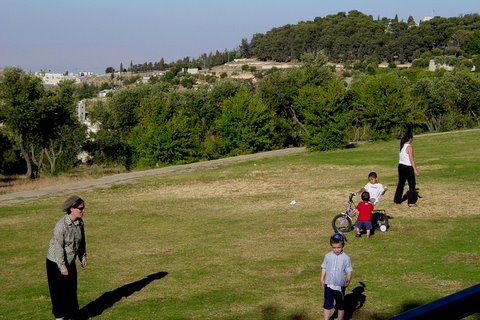
Families playing together on Jerusalem’s Tayelet
Family values
Today western families, including many Christian families are under great pressure. For instance, US Christians were recently shocked to learn that their divorce rate now exceeds the rate among the pagans.10 In many cases, the Church’s troubled families have not received much help from their ministers. Charles Colson writes concerning this: The divorce rate among clergy is increasing faster than in any other profession. Statistics show that one in ten have had an affair with a member of their congregation, and 25 percent have had some illicit sexual contact.11
Many families are fragmented and dysfunctional, spending little time together. There is teenage rebellion, sexual promiscuity, and drugs even in the Church. Something is dreadfully wrong. How can it be repaired?
Concerning the area of family relationships and family values, the Church has a great deal to learn from its Hebrew heritage.
In the Hebrew culture, marriage between man and woman is expected and the relationship is honored. After all, the Bible does tell us that it is not good for man to be alone (Gen. 2:18). Wilson points out that in biblical Hebrew there is no word for “bachelor.” He mentions that of the 613 commandments of the Law, the first is the command to be fruitful and multiply, or have children.12
Marriage was looked upon as a covenant (Mal. 2:14) or sacred agreement, patterned after God’s own covenant with Israel. Fortunately, marriage in earlier times was not based upon our Hollywood concepts of “love.” People who “fall in love” can also fall out of love. It is not so easy to fall out of covenant, however. The marriage covenant is to be a lasting agreement, as long as both husband and wife shall live. This is still reflected today in some of the older marriage vows that promise, “till death do us part.”
In the Hebrew heritage, love was something expected to grow in a marriage relationship. It was not necessarily an original ingredient. Until the last century or two, many marriages were arranged in the Jewish culture. We also see this in the Bible, as Isaac never met his wife, Rebecca, until the wedding day (Gen. 24:62-67). Love was expected to develop as time progressed.
The psychologist and pastor, Walter Trobisch, sums up the difference in our modern and in the biblical approach with these words: “We put cold soup on the fire, and it becomes slowly warm. You put hot soup into a cold plate, and it becomes slowly cold.“13
Also, in the Jewish culture, things like one’s family, faith, social position, profession, learning, etc., were considered much more than “love.”
Wilson also points out that the Jewish home has traditionally been a place of refuge, a little sanctuary (miqdash me’at) from the storms and pressures of life. The lovely Shabbat (Sabbath) table with its loaves of hallah, cheerful candles, full cup of wine (kiddush) were all pictures of the Temple and Tabernacle of old and of the Lord’s presence in the midst of his people.
The Jewish family, and even the extended family may gather around the Shabbat table and reinforce their family ties. The father is head of the house and spiritual leader of the family. At the Shabbat table he blesses each child, then he turns and publicly blesses the wife. In many families the world over, children and wives receive cursings. However, in Jewish families there are at least weekly blessings.
There are many other Jewish concepts related to the home that would be of great help to us in our modern Christian world today. In Jewish teaching, the family is more important than the synagogue.14 The family is therefore the center of Jewish life and teaching. This is a lesson from which we could well profit. In this day, some families are rushing to church meetings two or three nights each week as well as all day on Sunday. Small wonder that many families are feeling stressed out.
There is the concept of shalom bayit or a peaceful home. The Talmud gives instruction that conversation be gentle (Yoma 86a). Coupled with this, are the blessings that make up so much a part of Jewish life. The Jews not only bless the bread, the wine, the children and the wife, they bless almost everything else. There are blessings for washing the hands, seeing a rainbow, hearing it thunder, hearing good news or even bad news.15
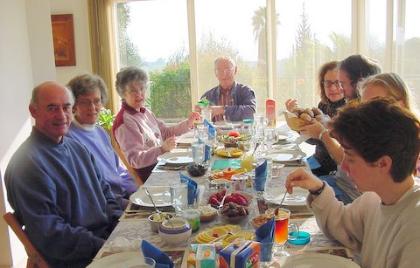
Guests prepare for a great Galilee breakfast
Photo credit Peggy Steffel
Israel also has the concept of hakhnasat orhim, or of inviting guests into the home. This is to be done graciously and cheerfully. We Christians have a similar concept in Romans 12:13, but often we do not take time to practice it. The rabbis considered hospitality one of the most important functions of the home, even greater than attending the house of study or receiving the Shekinah (the glory of God).16 Hospitality properly practiced, would be a sterling example of love and unselfishness set before youngsters in today’s
Christian family.
Learning, physical labor and respect for elders
In the Hebrew language, the word for parents is horiim. It is taken from the verb “to teach, direct or shoot as an arrow.” One of the primary functions of the parents was that of teaching and directing the children. This is not left to others. The Jewish Sages declare that when a parent teaches a child the Torah it is like teaching all the child’s unborn children as well (Talmud -Kidushin 30a).
Today on the buses in Israel, it is common to hear parents continually teaching and instructing small children even as they ride along. During the season of Tabernacles, one can hear the father teaching the children as they sit outside in their makeshift tabernacles or booths.
The Jewish people have placed great emphasis upon learning. This learning is often first expressed in the religious field, but also it is expressed in secular areas. Jewish parents have traditionally pushed their children to excel. There is an old humorous story of the Jewish mother who introduced her small children by saying: “The doctor is three and the lawyer is two.”
In Hebrew tradition the father had the sacred responsibility of not only teaching the child spiritual things, but even teaching him a trade. It is stated in the Talmud, “He who does not teach his son a trade is considered as having taught him thievery” (Kidushin 29a). Wilson points out that Jewish law forbids one earning a living through religion, and that the excellent thing was to combine the study of Torah with a secular occupation.17 We see this concept reflected in the New Testament. The Apostle Paul was a tentmaker as well as a preacher and teacher (Acts 18:3).
The Jewish historian, Paul Johnson, remarks that even the rabbis in earlier times were often some of the most efficient traders in the community. Johnson states, “…Rabbinical Judaism was a gospel of work, because it demanded that Jews make the fullest possible use of God’s gifts…”18
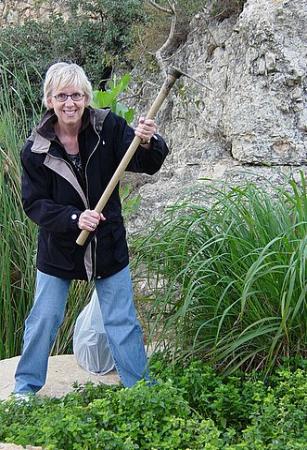
Christian pilgrim tries her hand at physical labor, planting a tree in Israel
In the Jewish tradition there has always been a respect for elders and for parents. Elders in ancient times sat in the gate of the city and made the daily decisions concerning the welfare of the people inside (Ruth 4:1-12). The elder in New Testament times was the one in charge of the welfare of the Church. In biblical times, it was customary for one to rise in the presence of his elders (Lev. 19:32).
We see in Judaism, that the family is the refuge, the place of peace, of teaching, or worship. In its early centuries, the Church took an unfortunate turn away from the biblical norms of marriage and family. From the Greek philosophers, the Church seems to have gotten the idea of asceticism (askesis). In the Greek culture, those philosophers who retired from the world were called “solitaries,” or monachoi, from which we get the word “monastic.” They were also called anachoretai, from which the Christian usage of “anchorite” has evolved.19
These Greek ideas contained a dim view not only of marriage and sex but even of the human body. Soon, asceticism, with its denial of marriage began to be in vogue. The Church has never fully recovered from this influence.
Halakhah
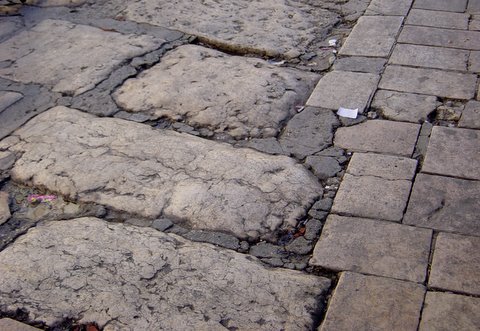
Jerusalem’s streets, revealing ancient Roman paving stones.
A place where many have walked over the centuries
Jewish life is determined by what is called halakhah, a word taken from the Hebrew “walk,” (ha-lak). Since Hebrew is a very poetic and expressive language, the word for walk has come to symbolize a person’s manner of life, what he does and how he lives. In Judaism, the body of commandments and traditions governing the religion has come to be known as the Halakhah.
As we seek to return to our Hebrew heritage, it might surprise us to learn that there is also a long neglected Christian halakhah.20 We see this in 1 John. 2:6, where it is said, “Whoever claims to live in him (Jesus) must walk as Jesus did.” John tells us that the Christian walk involves loving one another with a deep and abiding love (1 Jn. 3:11). We learn more about the Christian walk in other places in the New Testament, such as Romans 6:4, Romans 8:4, Philippians 3:18, and in the last chapters of Ephesians, starting with Ephesians 4:1. These passages all deal with practical instructions on how a Christian should live and conduct himself.
For instance, a Christian should be humble, gentle, patient, long-suffering, and ever striving for the unity of the Church (Eph. 4:1-3). He should live in righteousness, holiness, truthfulness, and productivity (4:23, 25, 28). He must get rid of unwholesome talk, bitterness, rage, anger, brawling, slander and malice (4:29-31). In their place he must be kind, compassionate and forgiving (4:32). The remainder of Ephesians is simply practical instruction on how a Christian is to live or walk. In many of Paul’s epistles there is a theological section, and at the end a practical section just like there is in Ephesians.
In our Christian tradition, we have placed a great deal of emphasis upon theology, being doctrinally correct, or being orthodox in our views. We hold firmly to a body of dogmas. We probably even developed the concept of dogma from the Greek philosophers, for they were the originators of it.21 Unfortunately, we do not often get this dogma or doctrine translated into everyday life.
We often “talk the talk” without “walking the walk.” In this area we can learn much from our Hebrew heritage, for the Jews place the emphasis upon the practical. When we look at our New Testament, we realize that the early Christians did the same, and their theology was constantly expressed in obedience and in works of righteousness. This outward expression of faith was the thing that separated true religion from the false religion of confession only, spoken of in James 1:22 and in 2 Peter 3:17.
We might talk about the theological correctness of visiting the sick, and even preach about it, without doing much to accomplish it. However, the Jews consider such visits (bikkur holim) as sacred obligations, and they are faithful to do them. We shun death and funerals while the Jews consider involvement in the funeral a mitzvah (good deed). For ages, the Jews have maintained a Hevra Kadisha (burial society), and consider it a great honor to serve on it. The work of preparing the body for burial, and the actual burial itself is done without recompense,22 as a good deed on behalf of the dead.
Jesus asks us a stern question in Luke 6:46, “Why do you call me, ‘Lord, Lord,’ and do not do what I say?” There is a whole area of obedience and practical working out of our faith that needs great improvement. We can learn much from the Jews and from their understandings of halakhah. When we learn to get our faith into our walk, we will be in for great blessings as John 13:17 tells us, “Now that you know these things, you will be blessed if you do them.”
AN UNDISCOVERED SOURCE OF BLESSING
God makes Abraham an incredible promise: “I will bless those who bless you, and whoever curses you I will curse; and all peoples on earth will be blessed through you” (Gen. 12:3). This promise assures us that there is a blessing in Israel. There is a blessing for the individual and the nation that blesses Israel. There is also a blessing for the church that does so and that learns of its Hebrew heritage.
Some pastors and churches have already experienced this truth. They have blessed Israel and have become blessed in many ways. We do not mean to present this truth as some sort of magic charm or amulet that can be worked for our own selfish purposes. God forbid! However, it is a biblical truth, and if pursued it will have results. The blessings may not be measured in money or even in multitudes flocking to church, although these things may happen. The blessings may rather be measured in depth and soundness of teaching and spirituality. We might need to mention that there may also be some tribulation for taking a biblical stand concerning this.
Long ago, Lot left the shadow of Father Abraham’s tent. In the shadow of that tent he was greatly blessed.23 Even heavenly beings came on occasion to visit that tent and to speak with Abraham. Abraham’s flocks and herds dramatically increased. Lot was increased also and was blessed along with Abraham.
However the day came when Lot turned from the heritage of Abraham. He pitched his tent in the luscious valley of the Jordan in the direction of Sodom. With this move, it seems that blessing permanently forsook Lot and his family. Soon he was carried away captive by the Babylonians and had to be rescued by Abraham (Gen. 14:1-16). Later he was smothered by the perverted life styles of his new home in Sodom.
Although Lot miraculously escaped the destruction of the city, he lost everything he had, except his two daughters (Gen. 19:30). These daughters then proceeded to bring forth children by their own father. The resulting nations of Ammon and Moab, later became avowed and eternal enemies of Israel.
Lot forsook his heritage in Israel and dwelt in Moab, but what a contrast with the beautiful story of Ruth. She forsook her heritage in Moab and dwelt in Israel. Because of the ensuing blessings, this poor young widow became married to an outstanding man in Bethlehem. and even became a part of the Messianic line in Israel.
A REVELATION OF NEW TEACHING TOOLS
Today the modern church is usually in a frantic search for teaching tools. So often, these are brought in from the world around us and therefore do not produce the spiritual fruit
we desire.
When we turn to our Hebrew heritage, we discover an abundance of teaching tools that are both biblical and spiritual in their nature. Many of these tools are found in the land of Israel. Israel might be called the biggest show-and-tell in the world. It is one designed by God to teach his people about their heritage. There are, however, many other tools that can be used by anyone regardless of what land they dwell in.
Today many Gentile churches are celebrating biblical festivals. In the spring they celebrate Passover. It is no longer unusual for churches, both large and small, to have regular Passover seders. The Passover (Pesach) is a great learning experience. In actuality, it is a celebration of our salvation. Young people can learn much about dabbling in sin by the lessons of the bitter herbs. As they taste the horseradish, tears come to their eyes. They remember that Egypt (the flesh) was a bitter place of tears and sorrow of heart and not of enjoyment. They can re-live the biblical drama of salvation and visualize the slain lamb, the blood upon the doorpost, the death of the firstborn.
In the fall, some churches now erect tabernacles and celebrate the biblical feast of Tabernacles (Sukkot). Many of the holidays of Israel are child-oriented and Sukkot is one of these. The erection of booths; their decoration; and even eating or sleeping out in these booths is sure to delight children. Often children can help in the construction, and certainly in the decoration of these tabernacles. It is a great opportunity to teach about the
biblical heritage.
Many of the holidays we celebrate in the traditional church are influenced by paganism. We need to hold to the biblical truths concerning these and expunge the pagan influences. It might also prove to be a blessing for us to celebrate biblical holidays along with the traditional Christian ones, and thus have our knowledge of the Bible increased.
Today, many churches have been enlivened by the festivals, Israeli music and even the Israeli dance. This is evidence of a growing Hebrew influence in the Church. In a real sense, it is evidence of a return to Zion.
A BIBLICAL PROGRAM OF EVANGELISM
The modern Church is constantly struggling, and without much success, to reach the un-churched world. Could it be that we have evangelism all backwards? The Lord plainly commanded the Church to go first to Jerusalem, then to Judea, then to Samaria and afterwards to the whole world (Acts 1:8). Everywhere Paul went, he presented the gospel first to the Jews and only later to the Gentiles (Acts 13:14: 14:1;17:2). In Romans, Paul says, “I am not ashamed of the gospel, because it is the power of God for the salvation of everyone who believes: first for the Jew, then for the Gentile” (Rom. 1:16).
After the apostolic era, the gospel never went to the Jew first as the Bible instructs. Once the early leaders had passed on, the Church hardly gave the Jews a chance to hear the gospel. Even in early times, the gospel was presented along with the sword. The Jews often had the unpleasant choice of accepting it or being murdered. Obviously it didn’t sound much like gospel or “good news” to them. Because we never approached Israel with our gospel, and because we even persecuted her with it, what we now consider good news is “bad news” to Israel. Our crosses and Christian crusades bring back horrible memories of Jews being burned to death in their synagogues by Crusaders, who also held and
wore crosses.
We have a terrible past to live down. Indeed we owe it to the Jews to show them a different Christianity and a different “gospel” than they have seen in the last two thousand years. It will necessarily need to be a gospel of repentance on our part, of compassion and good deeds and not just another triumphalistic and anti-Semitic version like they have seen so many times in the past.
Had we done things God’s way, the outcome would have certainly been different. Israel is the base of God’s redemptive activity on earth. We need to understand this fact. We cannot neglect that base and have our programs succeed in the world.
There are some interesting verses in John’s gospel. In John 10:16 we read: “I have other sheep that are not of this sheep pen. I must bring them also. They too will listen to my voice, and there shall be one flock and one shepherd.” Jesus was speaking from the perspective of Israel. The other sheep were obviously the Gentile believers.
The disciples and early followers of Jesus were all Jewish. Yet Jesus says in John 17:21, that he is praying not only for these followers, but for all those who would later believe (Gentiles): “that all of them may be one, Father, just as you are in me and I am in you. May they also be in us so that the world may believe that you have sent me.”
This passage raises an interesting question with its statement “that the world may believe.” Could it be that Jews and Christians coming together in unity will finally be the impetus for the conversion of the whole world?
LIFE FROM THE DEAD
The Apostle Paul in speaking of Israel has these interesting words to say: “For if their rejection is the reconciliation of the world, what will their acceptance be but life from the dead?” (Rom. 11:15).
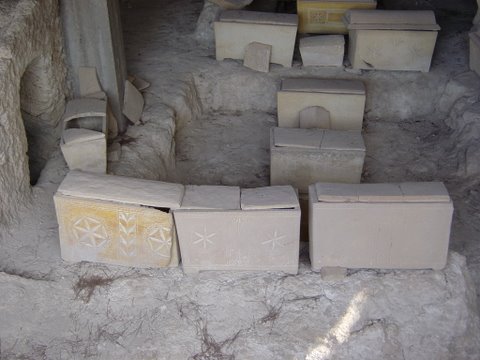
First century ossuaries (bone boxes) in a Mount of Olives tomb
This promise first concerns the actual resurrection of the dead. However, it would seem that it is also a promise to “dead” churches and to half-dead Christians. The reconciling of Israel will bring life from the dead. It will bring the resurrection and renewal of faith and
of life.
With this in mind we should pray for this reconciliation, and do all within our power to make it a reality.
WHAT CAN I DO?
Those reading this may ask, “Will my family and my church follow the old patterns of anti-Semitism? Will we ever find a biblical pattern in our lives and worship? Will there be blessing for me and my family? What can I do?”
Here are a few simple and practical things we can do to make a difference in the future of Israel, of ourselves, our families and our churches: 24
* Become well informed about Israel and the Jewish people. The study of Israel can be a formidable task for many. The Jews have lived in almost every nation and in virtually every time frame in history. The study of Israel will keep us busy the rest of our lives. It will also help us to better understand that part of the Bible most of us skipped over — the Old Testament, or Tanakh. Some would probably rather dismiss Israel and the arduous task of finding out the truth concerning God’s heritage, but let us persevere. Let us become informed.
*Become a source of information for others. We not only owe it to ourselves to become informed, we owe it to others. We need to help them – our families, our friends, and sometimes our teachers, or even our pastors. Many Christian organizations based in Israel and elsewhere would love to have Christians distributing their information to our family, friends, churches and other religious organizations. Many times, free or cut-rate bulk shipments of materials can be arranged for those interested in this work by simply contacting one of these organizations.
* Pray for Israel, Jerusalem and the Jewish people. There are several scriptures that will help us in this endeavor, such as Psalm 122:6-9 and Isaiah 62:7.
* Form a prayer group for Israel. This is an easy way to begin doing something constructive, in order that God’s prophetic plans may unfold in the nations. Prayer groups can range from two or three people to twenty or thirty or even more. If one is shy about this there is practical help available that can be requested from most of the organizations mentioned.
* Link up with those who love Israel: One person alone faces severe handicaps, as well as the concentrated opposition of the enemy. We need each other for mutual assistance and encouragement. Hebrews 10:25 instructs us: “Let us not give up meeting together, as some are in the habit of doing, but let us encourage one another–and all the more as you see the Day approaching.”
* Utilize God-given gifts and abilities. In 1 Corinthians 12:1-11, it is made clear that there are numerous gifts in the Body of Christ. All of us are not pastors or teachers. God has given other gifts for use in the Body that it may be edified. We need to ask God about our special gifts and make sure they are being used. Perhaps we have the latent gift of writing, speaking, singing, doing Israeli dance, or playing an instrument. When we faithfully try to serve God in our area of gifts, God will increase and perfect the gifts given.
* Make a pilgrimage to Israel. Join one of the many scheduled Christian tours to the land. Some tours, like those provided by Bridges For Peace and Jerusalem Cornerstone Foundation, are educational tours and have a period of preparation and study prior to arriving, with more study after entering the land.
* Volunteer in Israel. The founding of Israel in modern times has been made possible by volunteerism. Thousands of Jewish and Christian volunteers have labored in every conceivable position, from old age homes to support groups for the Israeli Army. Many Christian Zionist organizations now have volunteer programs where one can work for three, six, twelve months or longer in the land. Many of these opportunities are with the elderly, the poor and with new immigrants.

Volunteers from Bridges For Peace repair homes for new immigrants,
the poor and Holocaust survivors
* Put some of your money to work in Israel, and thus strengthen the nation: The Apostle Paul taught Christians to try and repay their debt to Israel and the Jewish people. He says in Romans 15:27, “…For if the Gentiles have shared in the Jews’ spiritual blessings, they owe it to the Jews to share with them their material blessings.” It may surprise us that the bulk of stewardship teaching, as well as the offerings taken in the New Testament concerned a collection for Israel. This is a good and biblical pattern so lets keep it up. Share your Christian love with God’s chosen, covenant people. Become a part of Bible prophecy.
* For those who absolutely cannot go to Israel, there is an alternative. It is possible to make aliyah (immigration) in your heart. The scripture says, “Blessed are those whose strength is in you, who have set their hearts on pilgrimage” (Psa. 84:5). One can dearly love Israel and pray for the peace of Jerusalem, yet never arrive in the land. Some of the greatest Zionists in history never actually reached the land of Israel.
SOME PITFALLS TO AVOID
There are obviously some dangers and pitfalls to avoid as we return and seek our Hebrew roots. One can be overzealous and become offensive both to Christians and Jews alike.
The Bible speaks of Gentiles clinging to the skirts (or perhaps prayer shawls) of the Jews in Zechariah. 8:23. Although this is true, we should learn to do this in as dignified and mature manner as possible.
We spoke earlier of celebrating Jewish or biblical feasts. One word of caution needs to be mentioned here. Although we may certainly celebrate and enjoy Jewish festivals, we Christians should exercise caution in attempting to appropriate these festivals and make them our own. Often our attitude in this can be offensive to the Jewish community. They consider it just another form of triumphalism and anti-Semitism.
There are also a few real danger areas we should mention in regard to our Hebrew heritage. Here they are:
Making an idol of Israel
Anything can become an idol. Even religious things can become idols, or perhaps we should say that especially religious things can become idols.
Otherwise well-meaning Christians can make an idol of Israel and even of the Hebrew heritage. Christian teaching must be kept in balance. In the past, many heresies have arisen simply because one teaching was carried to an extreme while other important teachings of Christianity were ignored. Just because we rediscover the Old Testament is no excuse to ignore the New Testament.
Teaching about Israel has definitely been out of balance in the past history of the Church. It has been out of balance in the sense that it has been almost non-existent. Now we have an opportunity to balance this important teaching with the rest of the Bible. Let’s not overdo it and turn the teaching into a heresy.
We must remember that Christ is central to our faith. He is the head. He must be first place in our hearts at all times (Col. 1:18). When we have Israel or anything else in that position, we become idol worshippers and the curses of idol worship will surely come
upon us.
The bondage of legalism
The Apostle Paul warns us in Galatians 5:1, “It is for freedom that Christ has set us free. Stand firm, then, and do not let yourselves be burdened again by a yoke of slavery.”
It is one thing to study our Hebrew heritage, however, it is quite another thing for us Gentiles to become compulsive about this heritage and especially about the requirements of the Old Testament Law. In the first century, the Judaizers were approaching the heritage in this manner and Paul sternly rebuked them in the book of Galatians.
Today there are Gentile Christians who feel compelled to keep the Sabbath and who expect that others do so. It is one thing to enjoy the Sabbath, but it is quite another thing to feel compelled and under bondage about it. The same applies to a host of things like wearing prayer shawls, refusing certain meats, etc. When we feel compelled, it is time to back off a bit, because we are getting into bondage.
The matter of circumcision for Gentile Christians is another problem area. The Bible is very plain in its teaching here. Listen to the stern words of Galatians 5:2: “Mark my words! I, Paul, tell you that if you let yourselves be circumcised, Christ will be of no value to you at all.”
The scripture makes it crystal clear that we Christians are saved totally by grace and through faith. It is such a gift, that not even the faith to believe springs from ourselves. Even our faith is a gift of God (Eph. 2:8).
Let us not make the mistake of the Judaizers in the New Testament. However, let us not make the mistake the early Church did in reacting to the Judaizers. They turned totally away from the Hebrew heritage and ultimately cursed the Jews.
The Jerusalem Syndrome
For those Christians who visit Israel, and especially for those who live in Israel, there is another hazard. It is known as the Jerusalem Syndrome. This is a mysterious but well documented illness that affects visitors to the land. Dr. Yair Bar-El, psychiatrist for the Ministry of Health, has made a study of this illness. Between the years 1979 and 1993, Bar-El studied 470 cases of visitors from all over the world who were afflicted with it. Bar-El determined that about 66% of the afflicted were Jews and 33% were Christians. Another 1% had no religions affiliation.25
It seems that perfectly healthy and normal visitors can come to the land and within a few hours suffer a drastic change in personality. Perhaps it is due to the stresses in Jerusalem or the spiritual pressure felt in the land. Some feel it is due to the unrealistic expectations many have in coming to the land, and the resulting disappointment at seeing real people, and not saints with golden harps. It is thought that with this, some people loose their senses and decide that they alone are holy.
Those afflicted by the Jerusalem Syndrome sometimes imagine that they are some biblical character from the past, like Elijah, or perhaps someone from the future, like one of the Two Witnesses. There is only one cure for this affliction. It seems that when these pilgrims are taken back to their homes they become perfectly normal again, and that in a
short time.
So when we visit Jerusalem, we must be careful not to get a sunburn from our own halo. We must not alarm our Christian brothers and sisters in Israel, as well as the Israeli police, by our strange behavior. We should try not to come out for the day’s touring in a white robe or one made of camel’s hair.
STUDY QUESTIONS
Give one example of how the restoration of Israel as a nation has brought the Old Testament to life.
List two archaeological discoveries that have shed new light on the New Testament.
What is meant by the term “fifth gospel?”
How might the study of our Jewish heritage help stabilize Christian homes in the present day?
Briefly discuss how “Christian halakhah” might transform the application of our faith to present day situations and challenges.
Based on Hebrew understandings, how could we possibly alter our evangelism program to make it more biblical and effective?
What book in the New Testament will help us most in guarding ourselves against the heresy of legalism?
NOTES
1. Hirsh M. Goldberg, The Jewish Connection (New York: Bantam Books, Inc., 1976) p. 11.
2. John J. Rousseau, & Rami Arav, Jesus and His World, An Archaeological and Cultural Dictionary (Minneapolis MN: Fortress Press, 1995) p. 28.
3. Rousseau, & Arav, Jesus and His World, An Archaeological and Cultural Dictionary,
p. 40.
4. Rousseau, & Arav, Jesus and His World, An Archaeological and Cultural Dictionary, p. 140.
5. Rousseau, & Arav, Jesus and His World, An Archaeological and Cultural Dictionary, pp. 74-78.
6. Rousseau, & Arav, Jesus and His World, An Archaeological and Cultural Dictionary,
pp. 225-227.
7. Bargil Pixner, With Jesus through Galilee according to the Fifth Gospel (Rosh Pina, Israel: Corazin Publishing, 1992) p. 15.
8. Pixner, With Jesus through Galilee according to the Fifth Gospel, p. 7.
9. Oswald T. Allis, Prophecy and the Church (Philadelphia: The Presbyterian and Reformed Publishing Company, 1964) p. 9.
10. George Barna, The Barna Report, Vol 1, Issue 1 (Ventura, CA: Regal Books, 1990) p. 6.
11. Charles Colson with Ellen Santilli Vaughn, The Body: being a light in the darkness, (Dallas, London, Vancouver, Melbourne: Word Publishing, 1992) p. 304.
12. Marvin R. Wilson, Our Father Abraham, Jewish Roots of the Christian Faith (Grand Rapids, MI: William B. Eerdmans Publishing Company and Center for Judaic-Christian Studies, Dayton, OH, 1989) pp. 199-200.
13. Quoted in, Wilson, Our Father Abraham, Jewish Roots of the Christian Faith, p. 202.
14. Wilson, Our Father Abraham, Jewish Roots of the Christian Faith, p. 216.
15. Richard Siegel, Michael Strassfield and Sharon Strassfield, editors, The Jewish Catalog (Philadelphia: The Jewish Publication Society of America, 1973) p. 152.
16. Wilson, Our Father Abraham, Jewish Roots of the Christian Faith, p. 219.
17. Wilson, Our Father Abraham, Jewish Roots of the Christian Faith, p. 222.
18. Paul Johnson, A History of the Jews (New York: Harper & Row, New York, 1987)
p. 172.
19. Edwin Hatch, The Influence of Greek Ideas and Usages Upon the Christian Church (Peabody, MS: Hendrickson Publishers, Inc., 1995) pp. 165-168.
20. See, Jerusalem Prayer Letter, Bridges For Peace, Aug. 1992.
21. Hatch, The Influence of Greek Ideas and Usages Upon the Christian Church, p. 119.
22. Siegel, Strassfield and Strassfield, editors, The Jewish Catalog, pp. 172-173.
23. See, Jerusalem Prayer Letter, Bridges For Peace, Feb. 1993.
24. See, Jerusalem Prayer Letter, Bridges For Peace, Dec. 1996.
25. See, Leah Abramowitz, The Jerusalem Post , 6 Sep., 1995, p. 7.
